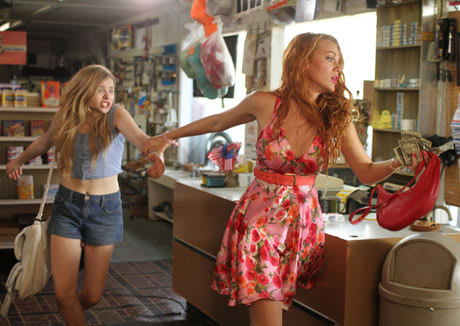Even though Derick Martini's directorial debut, Lymelife, was somewhat clumsy, working mostly as a low rent Ice Storm that showcased the talents of Jill Hennessy and Emma Roberts, there was a kernel of vision in criticizing middle-American ideals that suggested betterment with practice.
But, alas, Hick makes Lymelife look like Citizen Kane in comparison, being a tonally disastrous and directionless film that wastes the talents of capable actors with clumsy footage and zero consistency.
The titular hick is 13-year-old Luli (Chloe Moretz), who, upon receiving a .45 Smith & Wesson for her birthday, sets out on a cross-country trek from Nebraska to Las Vegas, where seemingly she would find herself along the way, according to road movie conventions.
Instead, the Western mythology is tackled in relation to the coming-of-age parable, wherein a gimp cowboy acts as an ersatz guardian angel, showing her the many life paths of a white trash girl in small town America.
Encounters with a cocaine-snorting prostitute (Blake Lively), a house full of meth heads and a pool hall rape scenario give Luli a taste of what the real world has to offer, crushing the idealized notions in her pop culture-laden head. The many movie quotes and character depictions she plays with at the beginning of the film eventually fade away as she accepts the world as it is.
Now, in theory, this could actually be an exceedingly sharp look at American mythologies and the delusional expectations they thrust onto the undiscerning and uneducated, which is something present in the Andrew Portes novel, especially considering the eventual outcome. But Derick Martini has no idea what to do with any given scene, allowing things to vacillate between manic and subdued while lingering on incidental footage that has no concept of pacing.
Add to this the fact that all of the actors think they're in different films and you wind up with a final product that's far too awkward and embarrassing to take seriously as an academic text.
There are a couple of moments that touch upon potential comedy, such as one where a convenience store robbery goes horribly wrong, but mostly everyone shouts over each other trying to make quirky something that fails miserably at being the dark comedy it was intended as.
(Lighthouse)But, alas, Hick makes Lymelife look like Citizen Kane in comparison, being a tonally disastrous and directionless film that wastes the talents of capable actors with clumsy footage and zero consistency.
The titular hick is 13-year-old Luli (Chloe Moretz), who, upon receiving a .45 Smith & Wesson for her birthday, sets out on a cross-country trek from Nebraska to Las Vegas, where seemingly she would find herself along the way, according to road movie conventions.
Instead, the Western mythology is tackled in relation to the coming-of-age parable, wherein a gimp cowboy acts as an ersatz guardian angel, showing her the many life paths of a white trash girl in small town America.
Encounters with a cocaine-snorting prostitute (Blake Lively), a house full of meth heads and a pool hall rape scenario give Luli a taste of what the real world has to offer, crushing the idealized notions in her pop culture-laden head. The many movie quotes and character depictions she plays with at the beginning of the film eventually fade away as she accepts the world as it is.
Now, in theory, this could actually be an exceedingly sharp look at American mythologies and the delusional expectations they thrust onto the undiscerning and uneducated, which is something present in the Andrew Portes novel, especially considering the eventual outcome. But Derick Martini has no idea what to do with any given scene, allowing things to vacillate between manic and subdued while lingering on incidental footage that has no concept of pacing.
Add to this the fact that all of the actors think they're in different films and you wind up with a final product that's far too awkward and embarrassing to take seriously as an academic text.
There are a couple of moments that touch upon potential comedy, such as one where a convenience store robbery goes horribly wrong, but mostly everyone shouts over each other trying to make quirky something that fails miserably at being the dark comedy it was intended as.




